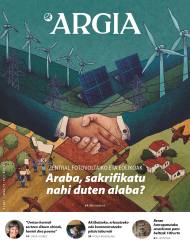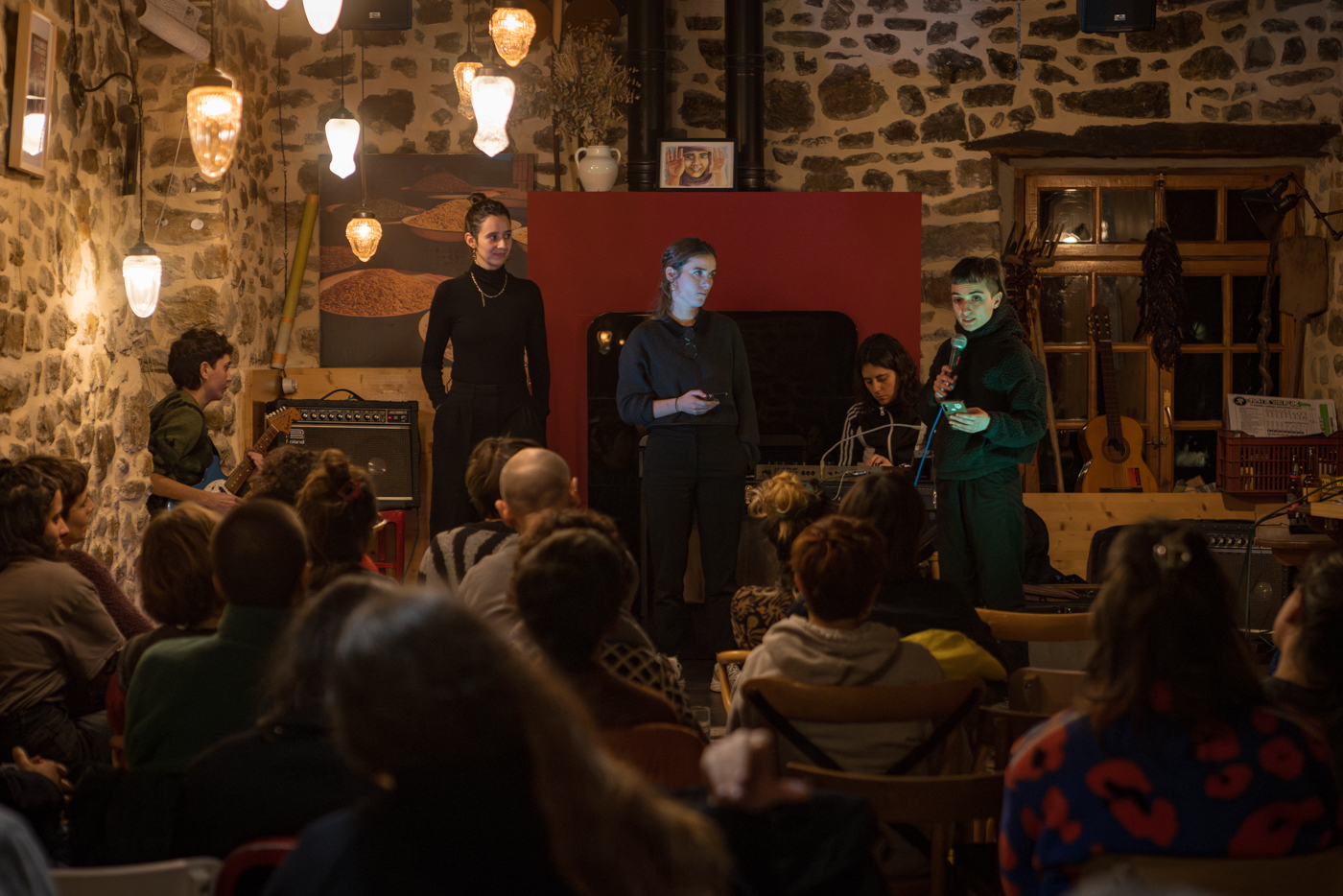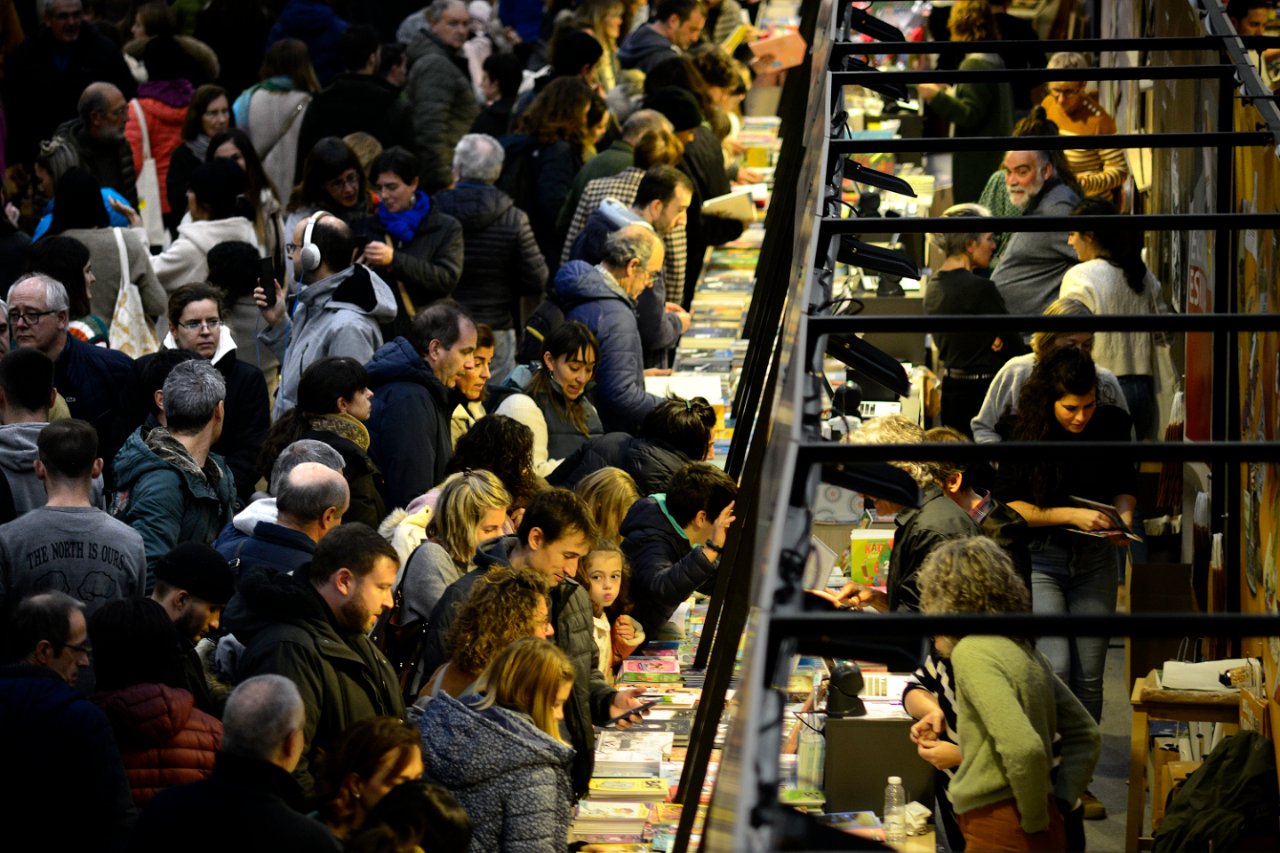"Poems are those waves that happen when you throw a stone into the water."
- Almost 10 years ago I had as a tutor in the Bachillerato, I met with Uxue Juarez in the Toureau caset (Alkiza) of the Ur Mara museum, surrounded by beech trees and sculptures of Koldobika Jauregi. Uxue is still the authority for me, but in another sense now. She wears a big smile on her face and backpack, a menstrual cup, a bottle of water and a writing notebook.

Uxue Juarez Gaztelu (Iruñea 1981)
He studied Hispanic Philology and began working in teaching. She's always been combining teaching with writing and a few years ago she's a mother. Although he has written poetry and children's stories, the hybrid texts are the most interesting to him. He currently works in an institute in Pamplona, where he teaches Spanish language and literature.
Why are we here?
We are in the Toureau caset of the Ur Mara museum in Alkiza. Joyera Elena Carajaville and sculptor Koldobika Jauregi set up a project to work on the relationship between art and nature and have held workshops, conferences, theatres and concerts. They also offer a creation grant, the Sormenaren Kabia grant from Alkiza, and that's why I'm here. People who come to this cottage come to find and try to reflect the relationship between word and nature.
I have come with my son and we will be here three weeks, I have enrolled in the Alkiza Forest School, so I can write in the morning and in the evening and in the afternoon I do the role of mother.
We are now in the middle of the hayedo. You hear no more than some birds and the wind. The
wind has accompanied us throughout the week and it has been crazy. Trees have fallen, branches have broken... When you're in town and you think you'll come to write about nature, you don't take into account that face B of nature, and that's another topic I'm working on. Nature as unknown or as beast: what we know, what not, what laws it has, if it allows us to enter and leave, the presence of animals…
You told me you've come with your son. How do you live that?
At first I saw it as an opportunity for both. I once read to writer Ingrid Christensen that when I received the scholarships, I didn't have a chance to leave the girl anywhere. Once it was up to him to go to Paris, he set up the stay in such a way that, as he wrote in the mornings, he gave his son the map of Paris and it was he who, looking at the map, prepared the afternoon program. I thought that was what I wanted to do in the mornings to make a plan for him when I was writing. But then I was invaded by anxiety because I came up with a lot of arguments against this.
There was an opportunity to register my son at the Alkiza Forest School and I decided to come. However, the start has been bittersweet. I had a very idealized plan, but with the issue of motherhood, you're getting external criticism at all times, and that raises the concerns that you can have inside. Motherhood and guilt always go hand in hand. Many times I feel selfish, because I want to protect the space from writing, but also my son. I have experienced this rivalry every day.
You are a writer, but you are also a professor. You have asked for a three-week leave to be here. Three weeks enough?
No. What you do the first week is a kind of landing. You should wash your head during that week or empty it. And that's where nature helps you immediately. But the head follows its course and is slow. And then what you do over the other two weeks is find triggers. What I'm doing is pointing at everything that comes to me in the notebook. What happens is that writing and anxiety always go hand in hand in my case. I want to write everything ha [laughs]. But what I'm doing is reassuring myself a little bit, pointing up ideas and knowing that I'm going to develop it next year. But yes, I missed having, for example, an entire year to develop everything I have in my head. And then I get frustration.
In addition, I come up with different projects at once, and I find it very difficult to focus on just one. When I'm developing one, ideas emerge for the other, as a bridge, that wake up to each other.
Teaching takes a long time in your life. Does this trade bring you more than economic tranquillity? Have you ever thought of letting it go?
I took a year of license to think about it. Seeing how the world is, I have a great social concern. I think everyone has to look for their way of influencing society, and the way I've found to do so has been teaching. When I'm in class, I see how hard the world is for teenagers. They're not naïve, they're aware of everything, although some still don't know how to structure or explain thought. I want to take advantage of the time I have to influence it and I have decided to do so from the point of view of humor.
On my return, I received love, joy and feedback. The writer's world can be very egocentric and reduced, and students bring me to reality, they teach me how the world is. And that's what I'm interested in working with the word: picking up how the world is, filtering it and, through the work, translating proposals or questions so that we think about each other.
What kind of faculty are you if I ask your students?
[Laughing] I'm sure some people say "crazy." Others that I'm chaotic and I do weird things, and others that are happy. And that the rebels are “femininity.” And right when you have to get in.
Who has more room to influence society: Professor Uxue or writer Uxue?
Uxue mothers, teachers and friends.
It is widely heard that in recent years the academic level has fallen.
We are surrounded by misinformation and are becoming more and more passive. I think it's getting harder and harder to be critical. I feel like we're living in dichotomy, and that's not the case, there's a lot of gray people, and you have to know them. This goes against the development of thought and the lack of wealth provokes the poverty of thought.
The screen is a very comfortable tool that has everybody globalized. Screens don't let you be active, apps are very intuitive and consumption increases as thought stands.
The world of work is also complex. Relationships are also mediated by screens and we are less and less with our boys and girls. We're all suddenly tired. We are multitask. It takes attention and time to set thought, and we're going in the opposite direction. Reading requires tranquillity and a slow pace.
Maialen Akizu recently wrote about the difficulty of care in Berria.
According to Maialen. We also have to ask good questions to draw attention to, and we don't spend time thinking about them. Instead of giving explanations, asking questions. There is also a infantilization on the part of teachers with respect to students.
Do you notice any change in attention since you were a student?
Yes. When I explain something, I do so as soon as possible. Then maybe a student asks me a question and disconnects me before the answer ends. After a minute you can ask me the same question and so on up to five times. That didn't happen before. And it's not their fault, of course, but it's worrying.
What should you feel to be able to read the writing and say “with this
going forward”?I usually picked up what I’ve written and passed it to a friend, Izaskun Gracia. He is also a writer and as a reference I like to gather his feedback. On other occasions, I also send samples to my friends. To end a poem, I have to feel that there's a tension that stays along the entire poem and holds a secret. That and a possible closure. And it doesn't have to be the end of the poem, there can be a lockdown before. The same is true of principle. There's a theory, I don't remember what its name is, which says that the beginning of a poem is always a little bit later than the initial lines. The initial lines are only valid for emptying the head. And well, they also help write, but then you have to take the poem out of there, like it was a sculpture.
The tension I mentioned is the one you know but you do not write. If you would write, you would treat the reader as a fool and you always have to be respectful of the reader, both of them are on the same level. What is not said is not only what is not said, but what you know, but what the other reads with his luggage in the space that you leave empty o.Son those waves that arise
when you throw a stone into the water. And when you ask for the stone and explain that, you destroy the poem.
He has written for children, but also for adults.
Yes, I started with adult poetry, but I quickly jumped into hybrid texts. I like to combine different disciplines. I took out the book Cerca Ciervos, which contains analogue photographs, to be an artist and supermolón, and collected quotes, poems and fragments from other texts extracted from the essays. That is what interests me most, because what is ultimately hybrid is not so easily classified. When I took out this book, I remember that when I was going to the bookstores, they didn't know what bookshelves to put on, and that seems to me political.
I also like working with other artists. I just worked with a photographer, now I'm with a musician… I like to see where the other person's speech takes you. And that also allows me to work collectively.
They say that the most solitary artistic activity is that of the writer.
That's a lie. To start with, you have other voices that are in your head: those of other writers, those of the people around you, the situations you imagine… And then there is an editor to take out a book, a corrector… Or in my case, now the musician, the photographer… There is also the person of the printing press, also the public.
He said before that coming here [to Alkiza] has been to immerse himself in the Basque country. In a text you have worked lately, you interpose Spanish and Basque.
Yes. So far I have had very low self-esteem for writing in Basque. I did the Spanish course and lost a lot of fluency in Basque. And of course, when I started writing in Spanish, I realized that I could do what I wanted in Spanish and not in Basque. I felt very limited.
Then I read the book by Agota Kristof Ilfabetoa, in which the writer recounts how his mother tongue is another, learns French and the limitations he had in that language help him find other ways. I realized that the limits I had in Euskera would make me think of ways that I wouldn't think of in Spanish. In addition, my son was born then and as I began to speak in Basque with him, the Basque also occupied other places in my life. That is why I say that motherhood and life are linked to writing. I started sharing texts with other writers who speak Basque, and there I saw that I could also write in Basque.
Relationships are often the protagonists of your texts.
Yes. In the texts I'm writing lately, there are many friends and protobikotes that never become partners. The latter is a subject that interests me a lot, because I think that right now the people of my generation, at least, are upside down in that sense.
We came from a very traditional model and we've known the world of applications to tie all of a sudden. We have seen that this model – the family and all that – does not work, but at the same time those have always been our benchmark, and now that we have spent 40 years we have come up with consumerism and lack of structure. I do not know how to say well what compromise is... Perhaps to reach agreements. And I'm very scared about it.
Here we all have our backpack and in the world of apps increases cowardice, ghosting and all that, you know. Many of these things I don't understand, and first of all, my instrument is writing, because that's it. Sometimes with initials and sometimes with names.
Writing then serves you to understand things.
Yes, it's a rite. It helps me with closures, for example. Western society has lost its tendency to rhythm and that says a great deal. Any grieving process needs to go through the closures. Today things are left very easily without closing and that is very strong. Writing serves me as a rite, too. When you don't have the answers, you have to get it right.
All of this has taught me that, as a teacher, as a mother and as a friend, I have to educate the projects of man around me, including my son, to develop my emotional responsibility. That's a struggle I want to take on.
Joan Tartas (Sohüta, 1610 - date of unknown death) is not one of the most famous writers in the history of our letters and yet we discover good things in this “mendre piece” whose title, let us admit it from the beginning, is probably not the most commercial of the titles... [+]

















ilbeltza-(1).jpg)





